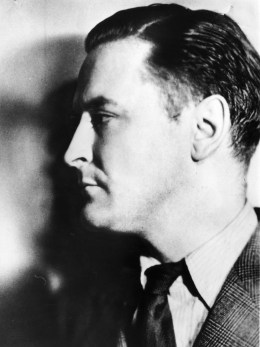
circa 1930: US novelist Francis Scott Key Fitzgerald
F. Scott Fitzgerald may not have coined the word stinko, but he may well have been the first English-speaking soul to write it down—according to the Oxford English Dictionary.
In the historical dictionary business, finding the first citation is a holy grail. Lexicographers spend their days scouring texts for the earliest datable examples of words being recorded. And often that search will end with big-shot authors like F. Scott Fitzgerald—men and women who are famous today partly because they bottled up the culture of another era. The first citation isn’t absolute, but it is the result of a lot of research done by a lot of very smart people.
In the OED, Fitzgerald’s name also crops up in the top citation for words like T-shirt, daiquiri and wicked (as in the way to describe cool stuff in the Boston area). “We try to find the earliest recorded usage of every word in every sense, because we’re trying to tell the history of the English language,” says Katherine Martin, head of Oxford’s U.S. dictionaries. “Sometimes literature is the best first place to find things. Authors are innovators.”
Martin does provide one caveat: some OED entries haven’t been revised since the dawn of the Internet, which means that Fitzgerald may eventually be toppled out of first place. But for now, here are some of the earliest citations from various dictionaries that he can lay claim to—including some very non-stinko slang you can throw around during the current Great Gatsby craze:
daiquiri: a cocktail containing rum, lime, etc., named after a district in Cuba.
From This Side of Paradise (1920): “Here’s the old jitney waiter. If you ask me, I want a double Daiquiri.”
doggone!: a general exclamation.
From “May Day” (1920): “Doggone! Here’s some liquor I’ll say!”
dopeless: useless; foolish; socially inadequate.
From “Bernice Bobs Her Hair” (1920): “He had to admit that Cousin Bernice was sorta dopeless.”
impactive: of, pertaining to, or characterized by impact; having an impact.
From Tender Is the Night (1934): “Feeling the impactive scrutiny of strange faces, she took off her bath-robe and followed.”
-parter: forming compounds denoting something, esp. a published work, with a specified number of parts.
From a letter in 1939: “I have … over half-finished what will be a two-parter for the Saturday Evening Post.”
pepped out: exhausted.
From This Side of Paradise (1920): “Don’t say a word; I’m tired and pepped out.”
sardine: a young woman.
From This Side of Paradise (1920): “I’d like to bring a sardine to the prom in June.”
splush!: nonsense, rubbish.
From “Bernice Bobs Her Hair” (1920): “‘Splush!’ said Marjorie. ‘Admit it!’”
stinko: of a very low standard.
From a letter in 1924: “I thought The White Monkey was stinko.”
T-shirt: a simple kind of garment, orig. a man’s undershirt, typically short-sleeved and forming the shape of a letter T when spread out flat.
From This Side of Paradise (1920): “Amory, provided with ‘six suits summer underwear … one sweater or T shirt..’, set out for New England, the land of schools.”
well-concealed: hidden, disguised, put out of sight in an efficient manner.
From Great Gatsby (1925): “He put out his … hand with well-concealed dislike. ‘I’m glad to see you, sir.’”
wicked: excellent, splendid; remarkable
From This Side of Paradise (1920): “‘Tell ’em to play “Admiration”!’ shouted Sloane … ‘Phoebe and I are going to shake a wicked calf.’”
This is an edition of Wednesday Words, NewsFeed’s weekly feature on language. For the previous post, click here.






